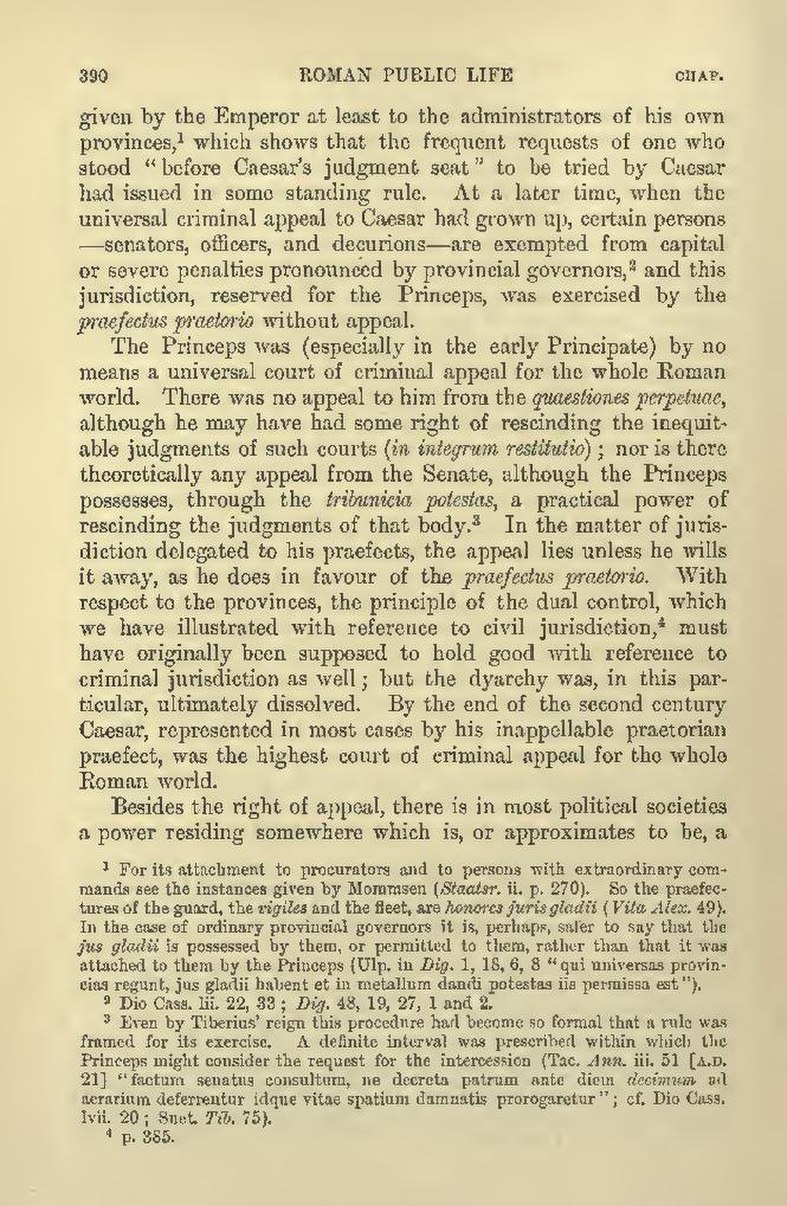given by the Emperor at least to the administrators of his own provinces,[1] which shows that the frequent requests of one who stood "before Caesar's judgment seat" to be tried by Caesar had issued in some standing rule. At a later time, when the universal criminal appeal to Caesar had grown up, certain persons—senators, officers, and decurions—are exempted from capital or severe penalties pronounced by provincial governors,[2] and this jurisdiction, reserved for the Princeps, was exercised by the praefectus praetorio without appeal.
The Princeps was (especially in the early Principate) by no means a universal court of criminal appeal for the whole Roman world. There was no appeal to him from the quaestiones perpetuae, although he may have had some right of rescinding the inequitable judgments of such courts (in integrum restitutio); nor is there theoretically any appeal from the Senate, although the Princeps possesses, through the tribunicia potestas, a practical power of rescinding the judgments of that body.[3] In the matter of jurisdiction delegated to his praefects, the appeal lies unless he wills it away, as he does in favour of the praefectus praetorio. With respect to the provinces, the principle of the dual control, which we have illustrated with reference to civil jurisdiction,[4] must have originally been supposed to hold good with reference to criminal jurisdiction as well; but the dyarchy was, in this particular, ultimately dissolved. By the end of the second century Caesar, represented in most cases by his inappellable praetorian praefect, was the highest court of criminal appeal for the whole Roman world.
Besides the right of appeal, there is in most political societies a power residing somewhere which is, or approximates to be, a"factum senatus consultum, ne decreta patrum ante diem decimum ad aerarium deferrentur idque vitae spatium damnatis prorogaretur"; cf. Dio Cass. lvii. 20; Suet. Tib. 75).]
- ↑ For its attachment to procurators and to persons with extraordinary commands see the instances given by Mommsen (Staatsr. ii p. 270). So the praefectures of the guard, the vigiles and the fleet, are honores juris gladii (Vita Alex. 49). In the case of ordinary provincial governors it is, perhaps, safer to say that the jus gladii is possessed by them, or permitted to them, rather than that it was attached to them by the Princeps (Ulp. in Dig. 1, 18, 6, 8 "qui universas provincias regunt, jus gladii habent et in metallum dandi potestas iis permissa est").
- ↑ Dio Cass. lii. 22, 33; Dig. 48, 19, 27, 1 and 2.
- ↑ Even by Tiberius' reign this procedure had become so formal that a rule was framed for its exercise. A definite interval was prescribed within which the Princeps might consider the request for the intercession (Tac. Ann. iii. 51 [A.D. 21
- ↑ p. 385.
